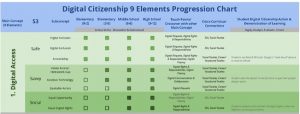Felling a little bit nostalgic looking at this week’s blog prompt…
What role should schools play in supporting students in the development of their digital identities?
This topic felt familiar to me, and not because of the edutaining class last week, but because I actually blogged about my own digital footprint and identity, as well as ponderings of digital citizenship in the classroom just last winter. Rather than just rehashing that, I am going to force myself to use ChatGPT to discover what the most critical issues concerning digital citizenship that students should be aware of are. Can’t wait!
As I am sure that just like anyone else who pasted that prompt into ChatGPT, I was informed that online privacy and security, cyberbullying, digital footprints, information literacy, and digital rights and responsibilities make up the critical issues for students.
… the overarching idea is that students should have a comprehensive understanding of how to use technology in a responsible and ethical manner.
Many of these terms are new, not just to education, but to society. Web 2.0 and Web 3.0 have certainly drawn attention to privacy and digital footprints, and as technology has continued to evolve, being digitally literate is a tool that everyone needs to have in their pocket. How does someone become digitally literate though?
Digital Literacy
Thinking about literacy and school, the two things go hand in hand. Foundational, health, and physical literacies have been a part of education for years. Financial literacy is now a credit class in high school. Nickey Pietila of skyward.com has stated that there are ten literacies being taught in schools today. It is no surprise that digital, media, and news literacies made her list. In a world where information is more easily accessible than ever, provided infrastructure and devices are in place, students are being taught ways to think critically about what they are consuming online. School has been a place where students are exposed to reading and interventions from the day they enter. Would it not make sense to have that same place keep up with the changing world and continue to educate students in being able to read and comprehend all sorts of media?

It was not that long ago that I was exposed to Dr. Mike Ribble, the Nine Elements of Digital Citizenship and the S3 Framework (safe, savvy, and social). Using the S3 Framework, Dr. Ribble has provided a path to share these elements with others, as well as different ways for students to practice and show what they have learned regarding the nine elements.
Digital citizenship is the continuously developing norms of appropriate, responsible, and empowered technology use.
As Dr. Ribble’s S3 Framework is to support, and reinforce the nine elements of digital citizenship. Learning about these elements, individuals (students if this becomes a part of classroom instruction) become familiar with protecting yourself/others, educating yourself/others, and respecting yourself/others in online environments. In a day where the current generation of students have been immersed in technology since birth, it is good to question if they have learned to use technology appropriately and ethically. Schools do have a role in developing digital and information literate students if you look at it through this lens.
More Than School
The wide reach of technology means that students are exposed to and using it beyond the walls of a school. Yes, it is important that education is doing its part to educate students so that they can make informed decisions around technology use, but there are more pieces to that puzzle than just school. Home and parents may play an even more critical role in developing this in young people. There are 18 other hours in the day where students are out of the school, and chances are high that they are in situations that being digitally literate would be beneficial.

Students should, no need to, be able to have conversations with their parents about this important topic. At some point though, there needs to be a shift in what parents know to be able to participate in those discussions. Is it then up to education to change what is valuable based on societal needs, and do its best to meet those demands? If education can move in the direction to make digital citizenship important enough to be explicitly taught, will that shift what this generation of students knows and build a knowledge base that can be used as they move into adulthood and the role of parents down the road?
Thank you Bart for sharing this very informative post. I can imagine how intelligibly knowledgeable students we have in this digital age, given all the utmost possibilities that tech savvy, CHATGPT, smartphones, etc, all are accessibly incredible by our hands 24/7.
In education and at home we can’t deny how we educate and teach our children the responsibility they should take on these high-tech gadgets and apps. However, I am still skeptical about how more solemn lives, work ethic, businesses, human brain at work, home, and distance relationships of families, communities, friends, and lovers can change over a period of time with too much reliance on all the high tech ever created.
In education, or in my Math classroom, for example, I would still love to use my voice and their voice to engage in lessons and conversations. I would say using available tech-savvy apps, and software can still limit the sense of the human brain and touch, and the human hands at drawing, painting writing, and scribbling on their notes, etc. Imagine if a student would love to ask his/her teacher about problem-solving, do you want to see a talking Math solver App instead of the teacher’s natural voice?
Sooner or later, with AI’s super ability, all companies’ customer care will be through a TALKING MACHINE. I wouldn’t like to see myself talking to a machine about my grievance over a product or service I bought that needs human attention. I still want my self to talk to a human being listening and conversing about how we can arrive at a win-win solution to a real-life problem that happened in a real situation at home, in education, and in business establishments.
Hi Bart, you ended your post by asking some very compelling questions. You also touched on what is the responsibility of parents in relation to digital literacy. This can be a tricky question. Parents are children’s first teacher. Educators have the role of supporting the child, and that means supporting the family too. The relationship between school and parents can struggle when values clash. Every teacher has had an interaction with a student, and their cell phone that should not be at the school IS at school. We all know how that ended…. Teachers can find themselves in a bit of a minefield when their expectations (and lessons) about digital literacy are different than parents’ expectations and beliefs around digital literacy. Personally, I look to the curriculum. If it is written there, I teach it. I am curious, how do other teachers manage this sometimes tricky relationship?